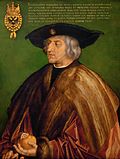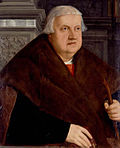Conrad Celtes (redirect from Konrad Celtis)
Conrad Celtes (German: Konrad Celtes; Latin: Conradus Celtis (Protucius); 1 February 1459 – 4 February 1508) was a German Renaissance humanist scholar...
17 KB (1,916 words) - 07:05, 25 October 2024
Reformation. One of the most important German humanists was Konrad Celtis (1459–1508). Celtis studied at Cologne and Heidelberg, and later travelled throughout...
19 KB (2,194 words) - 12:08, 31 July 2024
the Schedelsches Liederbuch, and the Glogauer Liederbuch. The scholar Konrad Celtis (1459–1508), the Arch-Humanist of German Renaissance, taught his students...
11 KB (1,188 words) - 22:46, 6 October 2024
university. Maximilian invited Conrad Celtis, the leading German scientist of their day to University of Vienna. Celtis found the Sodalitas litteraria Danubiana...
392 KB (43,603 words) - 09:46, 13 November 2024
Augustana), following the model of the Heidelberg society established by Konrad Celtis. Peutinger built an extensive scholarly and political network that membership...
11 KB (1,200 words) - 14:08, 20 August 2024
Retrieved 31 July 2022. Hrotsvitha; Kulmbach, Hans von; Dürer, Albrecht; Celtis, Konrad (1501). Opera Hrosvite, illvstris virginis et monialis germane, gente...
64 KB (7,102 words) - 07:48, 2 October 2024
Hallerstein (1478–1534), astronomer Hieronymus Haller (?–1519), friend of Konrad Celtis, paymaster of Emperor Charles V Wolf Haller von Hallerstein (1492–1559)...
14 KB (1,808 words) - 13:42, 8 October 2023
latinisation of the name Conrad or Konrad, but is also a Dutch given name. People called Conradus include: Conradus Celtis (AKA Conrad Celtes, 1459–1508)...
2 KB (225 words) - 20:32, 13 June 2023
first German Neo-Latin tragedy, also the first German Humanist tragedy. Konrad Celtis wrote for Maximilian Ludus Dianae and Rhapsodia de laudibus et victoria...
307 KB (33,641 words) - 17:56, 26 September 2024
and became a friend of Conrad Celtis, an eminent advocate of humanism who lectured there between 1492 and 1497. When Celtis moved to Vienna in 1497, Stöberl...
15 KB (1,678 words) - 01:08, 3 September 2024








